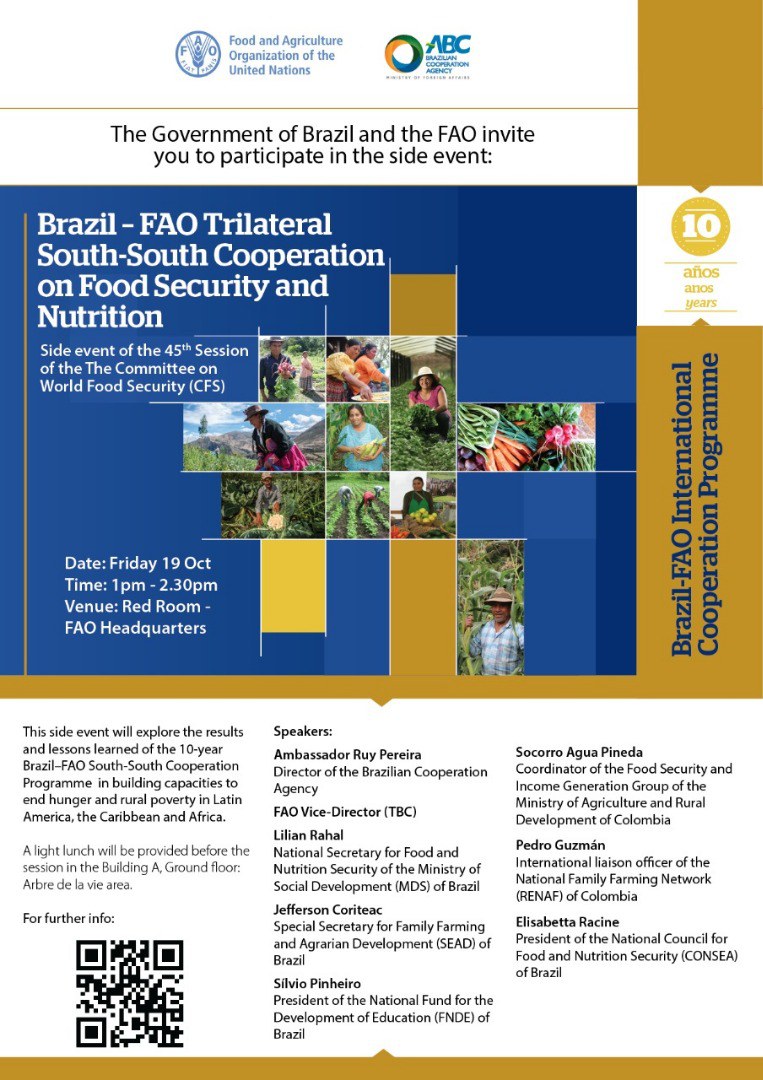Notícias
CFS Side Event: "Brazil – FAO Trilateral South-South Cooperation on Food Security and Nutrition"

- Brazil – FAO Trilateral South-South
Time: 1pm - 2.30pm
Venue: Red Room - FAO Headquarters
Organizers
Brazilian Cooperation Agency (ABC) of the Brazilian Ministry of External Relations
National Education Development Fund (FNDE) of the Brazilian Ministry of Education
Special Secretariat for Family Farming and Agrarian Development of the Brazilian Presidency
Brazilian Ministry of Social Development (MDS)
FAO Regional Office for Latin America and the Caribbean
Colombian Ministry of Rural Development
Colombian National Network of Family Farming
Abstract
In the last two decades, Brazil has achieved significant results in the fight to hunger and rural poverty due to a comprehensive set of public policies on Food and Nutrition Security (FNS) based on the Human Right to adequate food. For this reason, Brazil has become a reference on FNS, arousing great interest of the international community, particularly in Latin America and the Caribbean.
In order to share the Brazilian experiences in the area, Brazil and FAO established, in 2008, a Global Trilateral South-South Cooperation Program, which started its activities in Latin America and Caribbean. This successful partnership involves the Brazilian Government, through the Brazilian Cooperation Agency (ABC) and more than 15 Brazilian Ministries; FAO through its network of Regional and country offices; and countries from the region. Throughout this decade, Brazil has invested almost USD 60 million in more than 30 projects.
The objectives of the Programme are building institutional capacities of governments to elaborate, implement and monitor effective and inclusive policies to end hunger, as well as strengthening permanent and multi-stakeholders dialogue spaces on FNS. The main axis of the Programme are: i) strengthening of sustainable and integrated school feeding programmes to promote healthy eating habits and provide institutional markets to local family farmers; ii) strengthening of family farming, through a comprehensive set of policies that encompass technical assistance, credit and social protection; and iii) strengthening of FSN Governance that ensures the necessary articulation among different sectors and multi-stakeholders participation.
After 10 years, the Programme achieved important results, especially in terms of fostering strategic alliances at regional and national levels for FNS, promoting a parading shift of FNS as a fundamental means to ensure inclusive and sustainable development, supporting the reform of legal and policy frameworks, and expanded access of family farmers to institutional markets.
What are the major lessons learned of Brazil - FAO Trilateral South-South Cooperation Programme? How can the programme contribute to address the emerging challenges for FNS in the region, especially regarding the increasing obesity rates and the climate change negative impacts on livelihoods? What are the key innovations foreseen for the following years? These are the key questions that this side event will address.
Speakers:
- Ambassador Ruy Pereira, Director of the Brazilian Cooperation Agency (ABC)
- FAO Vice-Director (TBC)
- Lilian Rahal, National Secretary for Food and Nutrition Security of the Ministry of Social Development (MDS) of Brazil
- Jefferson Coriteac, Special Secretary for Family Farming and Agrarian Development (SEAD) of Brazil
- Sílvio Pinheiro, President of the National Fund for the Development of Education (FNDE) of Brazil
- Socorro Agua Pineda, Coordinator of the Food Security and Income Generation Group of the Ministry of Agriculture and Rural Development of Colombia
- Pedro Guzmán, International liaison officer of the National Family Farming Network (RENAF) of Colombia
- Elisabetta Racine, President of the National Council for Food and Nutrition Security (CONSEA) of Brazil
A light lunch will be provided before the session in the Bulding A, Ground Floor: Arbre de la vie area.
For further info: comunicacao@abc.gov.br